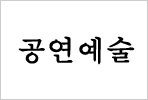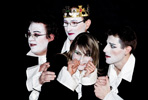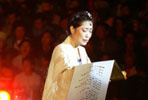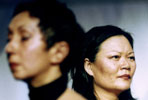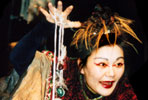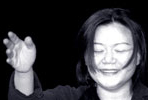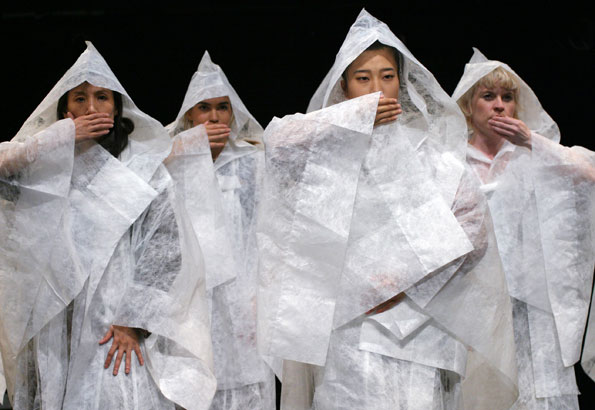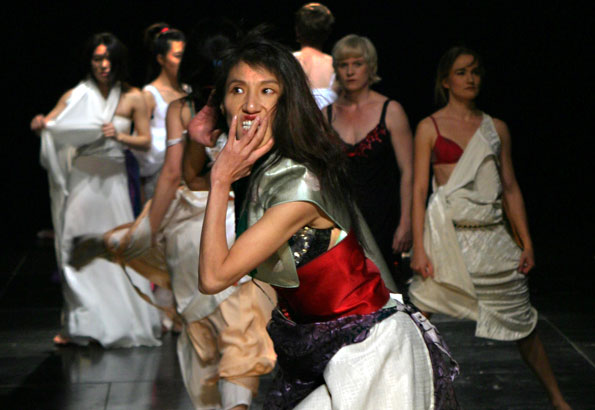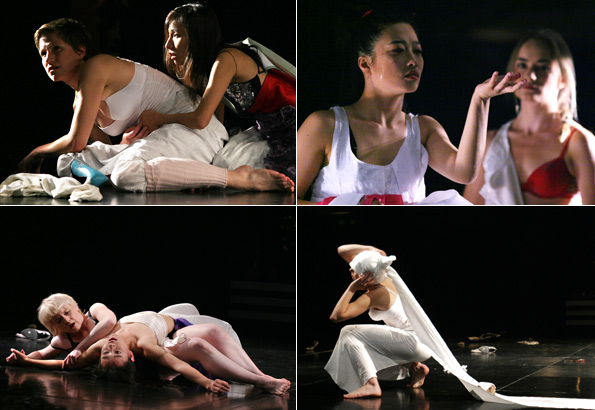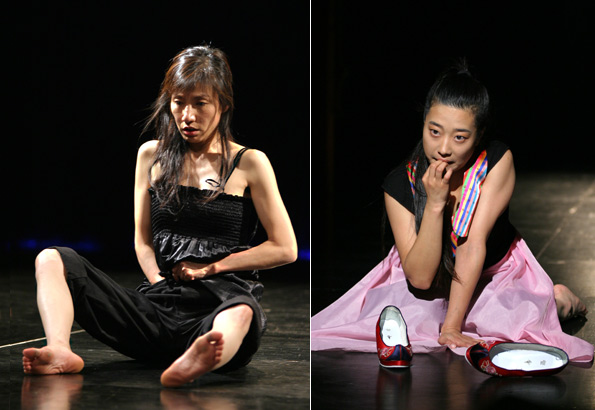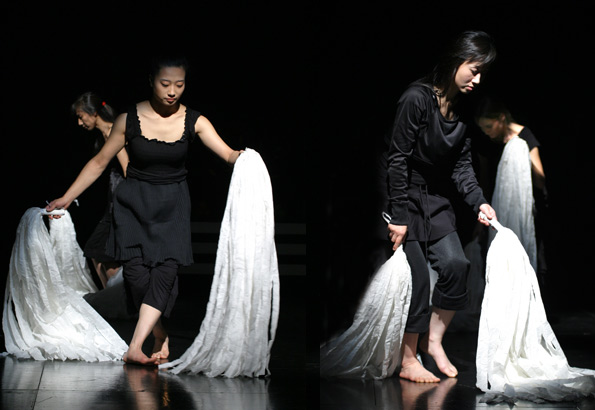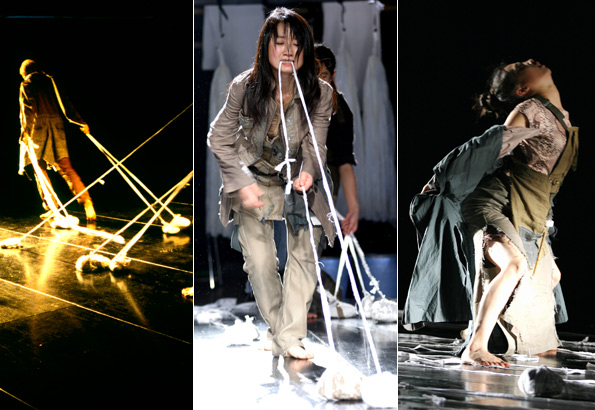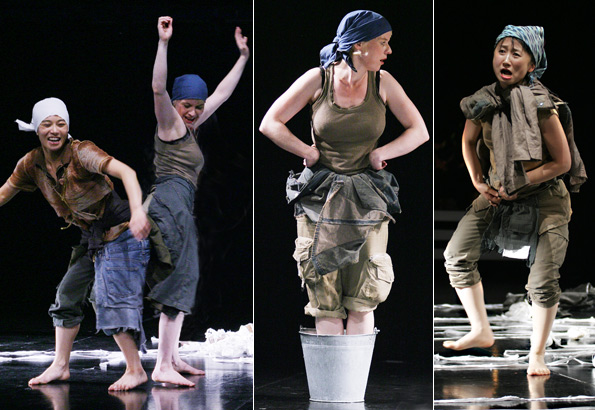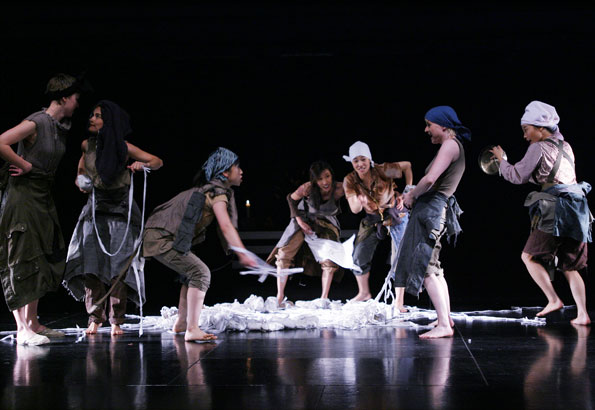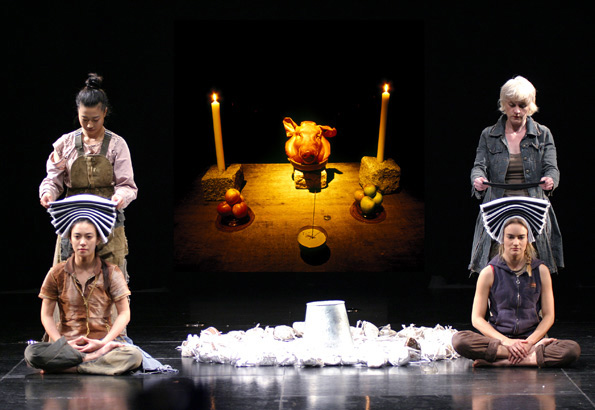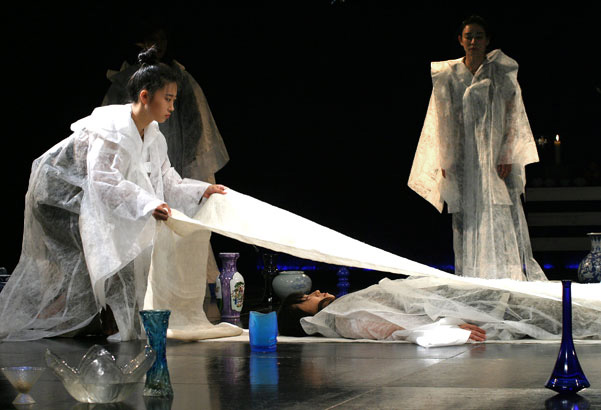
- Share:
- Google Plus
PRINCESS PARI
Princess Pari
A theater research on the korean myth of the origin of the first Shaman Princess Pari.
An encounter between korean and german actresses.
Premiere: 24st September 2005
WERKSTATT DER KULTUREN Berlin,
Festival „Shamanism Now“
Asien-Pacific-Weeks Berlin
| Directed by | Dietmar Lenz |
| Text | Dietmar Lenz, Stine Schulz |
| Choreography | Soogi Kang, Kyu-Man Shim |
| Assistant | Soogi Kang, Kyu-Man Shim |
| Stage design | Yoshio Yabara / Dietmar Lenz |
| Costume design | Yoshio Yabara / Gregor Klages |
| Music composition | Zam Johnson / Soogi Kang / Kyu-Man Shim |
| Light-Design | Dietmar Lenz / Angelo Teixeira |
| Dramaturgy | Harald Harzheim / Stine Schulz |
| Fotos | Francisco Conde |
| Actresses | Carola Grot Alexandra Hökenschnieder Young-Nam Jang Ae-Ran Lee Jee-Ha Lee Hee-Jung Song Lale Weisshaar |
An Encounter with the myth of Princess Pari. As the seventh daughter she was thrown out into "the bloody ocean" by her kingfather. She overcomes this trauma by being initiated in the "underworld" to the first shaman. The profession of a shaman as a performative medium of gods and spirits, in analogy to the actress, who makes herself the medium of her role, "embodying" an imaginary personality. Both practices combine aesthetic and therapeutic subjects to bring back the "dead" soul out of the "underworld".
9 weeks Encounter between four Korean actresses from Seoul and three actresses from Berlin.
9 weeks trans-Lation from German to Korean & from Korean to German.
9 weeks which brought language off the rails, often letting it say something else than one was expecting.
9 weeks which brought into oscillation the relation between YOU and ME; brought into oscillation the different perceptions, the different ways of understanding, the different ways of acting of korean and german actresses.
9 weeks Encounter with themes that are givven by the origin myth of the shaman from Korea : where do I come from, to kick off ones own child, the relationship between daughter and father, the enduring of ego-death, surrender and devotion, the mirror of love, the water of Life.
9 weeks which opened the tubes of intercultural communication: near strangers and strange friends.
Making a performance in the frame of an intercultural research- and exchange project is a task with very specific demands. Opening new doors of perception and developing tools of creation together was our priority.
The purpose is to open up for the experience and performance of a more authentic language of theater and expression, to nourish an intuitive flow of creative power beyond the personal and technical movement.
... To step into an intercultural reading of the fluctuating landscapes of performing arts : basic elements like perceptual and aesthetic awareness, sensorial body-mind balance, centering, transformation of energy and creativity, release technics such as breathing-whirling-jumping, rhythm, radiance and gravity, strength and flexibility, singing-chanting-screaming, improvisation, composition - to extend the psycho-physical-spiritual expression to a more vivid and wider range.
Princess Pari – the lost Princess
The origin myth of Korean Shamanism "Princess Pari" is sung by a female shaman within the CHINOGI KUT called shaman death-ceremony, which aims to open the gates to the life hereafter for the soul of the deceased. Before the shaman is leading the soul out of this world, this ceremony allows the soul of the dead, as well as the survivors, a "break" (kor. Malmi). In this intermediate time, this void between life and death, the shaman dresses herself in a rainbow-colored costume of a princess and sings the EPIC SHAMAN SONG about a king, who by anticipating a throne successor, is kicking out the unwelcomed seventh daughter PARI into the sea of blood beyond the yellow springs. PARI grows up in darkness, inaugurated in Buddhist-shamanistic practices. PARI can be seen as a subject of risk at the border, outside the symbolic order, in love of one's Will. "Dancing in the shadow of its negation" PARI pierces on her underworld journey the gates of hell and is finding the waters of life, with which she raises her dead father back into life. "A kingdom is not of time. I want to be the queen of mudang, the shaman, to save all mankind", these are the last words of this shaman epic song. On the zero line, facing the infinite, the shaman draws the symbol of a transformational subject who raises up oneself by facing the unknown. What we see and hear is a hymn for the "indestructible life" (K. Kerenyi). "The shaman goes beyond entertainment reaching the core of the culture" (Richard Schechner). Entering into the shape of PARI, means to practice a "culture of transition" between space, vision and body, between life and death, between mankind and the sacred. To bring oneself into contact with this figure, is to ask about the relationship between sovereignty and dignity in the act of giving onself. Dietmar Lenz
Excerpt from "The lost Princess"
The stream of time flowing there.
The wind blew the winter,
blew the spring,
blew away the three moons of summer,
since the first maid hurried to the king:
"Get the oracle, the oracle bring!"
Because to the Queen the steaming rice suddenly tasted as crude;
the water she drank, had the taste of earth;
and the soup seemed to her like immature bean paste.
The signs of maternal happiness!
She slept under blankets of silk, her head was resting on golden pillows.
The wind blew through the East window,
but she had not the strength to rise.
It seemed as if her hips were melting.
The master of the Grand knowledge of the temple under the sky
threw the sticks of coral onto a tray of white jade.
The first litter showed the buzz of ten thousand spirits.
The second litter showed the verdict of the upper and lower gates.
The third litter finally showed the answer,
that really concerned the issue of the king.
said the oracle,
"A royal descendant would have given to him.
But because he had married in a year - closed to good fortune -,
his first child will be a girl. "
"Though the gifts of your prophecy are to be admired ...
But what do you know already?" The king replied.
In the ninth moon the midwives were ready ---
the Queen took aside her pearls adorned pillows,
and after a beautiful birth, she turned to her newborn:
It was a princess.
"If she can give birth to a princess
why not to a prince?" the king said
and gave his first daughter the name Peach Red Moon.
Produced by THEATER SALPURI Berlin, THEATER IN BETWEEN Seoul, WERKSTATT der KULTUREN Berlin.
Supported by: Hauptstadtkulturfonds Berlin, Deutsche Klassenlotterie, Haus der Kulturen der Welt Berlin, Korean Ministry of Foreign Affairs, Korean Ministry of Culture and Tourism.
